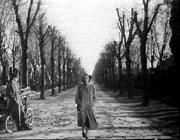Johnny Caspar is the most obvious element in the Coen Brothers attempt to magnify ethnic differences in Miller’s Crossing. In order to succeed in the business, Giovani Gaspari had to change his name to something a bit more Anglo. Even when his gang is on the up and up, the mayor gives him the run around. Johnny calls it “the high hat” and Tom addresses it as “Double Talk.” Whatever term you go by, you see quite clearly that political corruption isn’t the mayor’s only problem at hand. He’s got some issues with race too. Johnny’s vendetta against Bernie also seems to have some racial complication in it, namely that Leo isn’t about to let an Italian call the shots on a Jewish friend. Then you have Tom and Eddie, both right hand men and both ethnic outsiders. Tom’s Irish background, as well as his brains, seems to allow him to move in between since he has no ethnic ties to either side. Eddie the Dane (originally to be played by Peter Stormare, who the Coens always use in innovative ways) is also an outsider, and manages to keep his head clear of prejudice, observing things clearly and being equally ruthless to just about everyone.
The Glass Key seemed to touch on these issues a bit. Madvig seemed to be a WASP while Shad O’Rory’s Irish background was quite evident. The 1942 film changed O’Rory into a more ambiguous ethnicity, though he seemed Italian to me. Yojimbo may have had some cultural rifts, but since I know little about feudal
Japan, I cannot identify what they are if there are any. Verna’s moment in the film was quite wonderful. Repeating “Drop dead.” To Tom while walking past him was a great punctuation mark, both repeating the line she says most throughout the film, and also a nice homage to The Third Man.

Martin Scorcese actually just referenced the same scene at the end of The Departed, if you have the pleasure of seeing it. Such instances are great examples of how films live, grow, and manage to shape each other.
